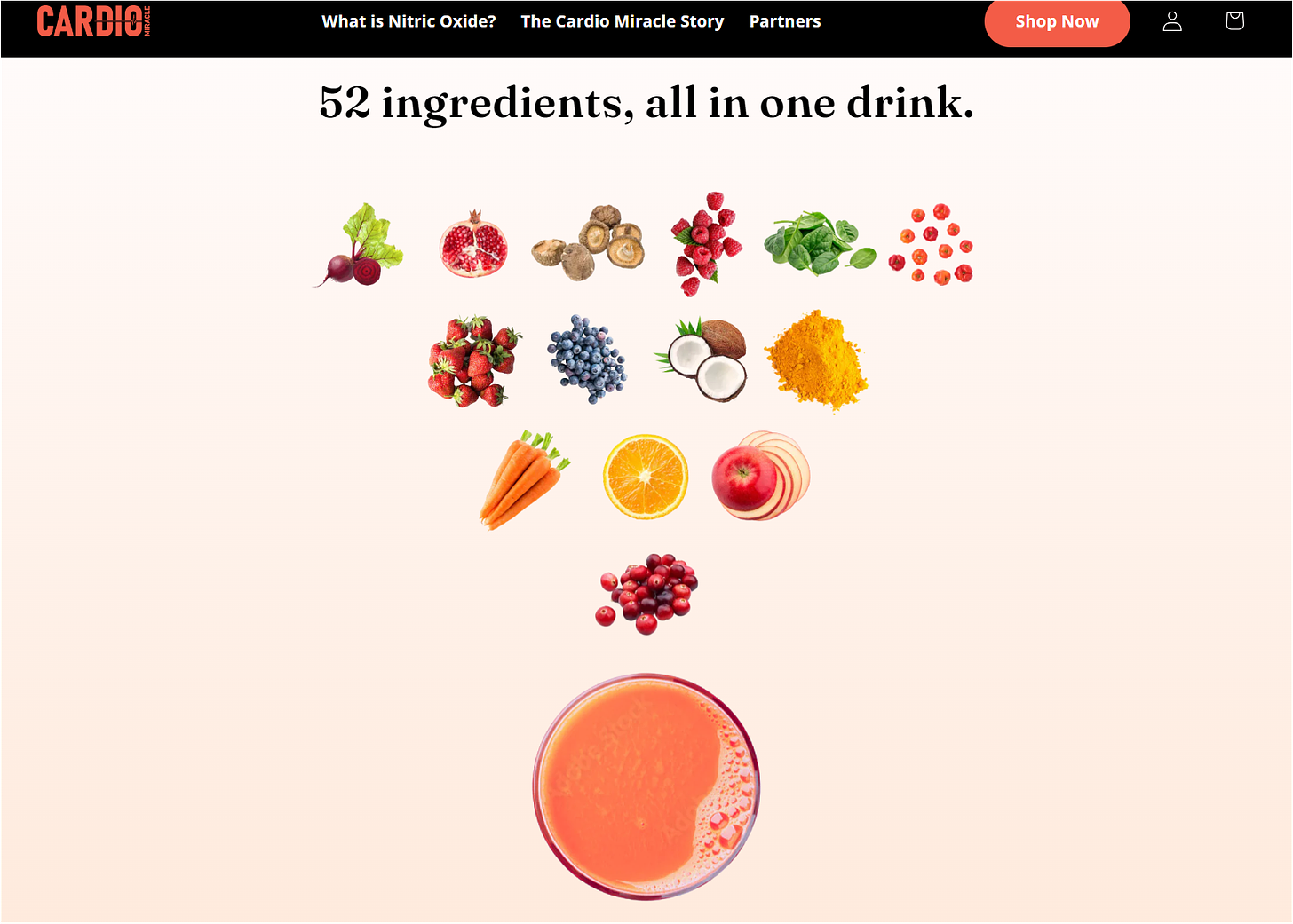A Simple Guide to Combat Nitric Oxide Deficiency
Did you know that this miracle molecule plays a crucial role in your body?
Follow: Twitter | Instagram | Telegram | Gab | Facebook
Truth Lives Here: Rumble | Rokfin | Odysee | Brighteon | Bitchute | YouTube
Websites: MaryamHenein.com | HoneyColony.com
Do you suffer from Nitric Oxide deficiency, often referred to as "nitric oxide insufficiency”?
Chances are you've never even heard of this tiny molecule even though it has a big impact on our health.
Nitric Oxide (NO) plays a crucial role in your body by helping to relax blood vessels, improve circulation, and support overall cardiovascular health. NO also influences blood pressure, kidney function, and the dietary response to salt in your body.
There are hundreds of thousands of nitric oxide studies available online, and a common thread among them all is that nitric oxide is a messenger molecule, navigating diverse pathways throughout all 100,000 miles of your endothelium lining (the smooth tissue lining in blood cells, arteries, and capillaries). There are a lot of messages that nitric oxide needs to help translate to the body and a lot of communication channels that need facilitation for healthy performance.
Sometimes, however, our bodies don't produce enough nitric oxide. Unfortunately, nitric oxide deficiency is not a widely recognized or well-defined medical condition.
It's important to note that symptoms of nitric oxide deficiency are often associated with underlying health conditions such as cardiovascular disease, diabetes, or metabolic syndrome, which can affect NO levels.
These symptoms can include:
Hypertension (High Blood Pressure): Reduced nitric oxide levels can lead to vasoconstriction (narrowing of blood vessels), contributing to high blood pressure.
Poor Circulation: Insufficient NO may result in reduced blood flow, leading to symptoms like cold extremities, numbness, or tingling.
Fatigue: Decreased blood flow and oxygen delivery to tissues can lead to fatigue and reduced exercise tolerance.
Erectile Dysfunction: NO plays a crucial role in the relaxation of blood vessels in the genital area, so deficiency can contribute to erectile dysfunction in men.
Chest Pain: Reduced NO availability can affect coronary blood flow, potentially leading to chest pain or angina.
Cognitive Impairment: Insufficient NO may impair blood flow to the brain, potentially contributing to cognitive issues, including memory problems.
Shortness of Breath: Inadequate NO can affect the relaxation of airway muscles, potentially contributing to shortness of breath, especially in individuals with conditions like asthma.
Additionally, factors that can contribute to reduced nitric oxide production or function include:
Age: Nitric oxide production tends to decrease with age, which can affect vascular health and overall circulation.
Cardiovascular Conditions: Conditions such as hypertension (high blood pressure) and atherosclerosis (narrowing of the arteries) can impact nitric oxide function and contribute to cardiovascular problems.
Poor Diet: A diet high in processed foods, saturated fats, and low in nitrate-rich foods like vegetables can negatively affect nitric oxide levels.
Lack of Physical Activity: Regular exercise stimulates nitric oxide production, so a sedentary lifestyle may lead to reduced nitric oxide levels.
Smoking: Smoking is known to damage blood vessels and reduce nitric oxide availability.
Chronic Stress: Chronic stress can disrupt nitric oxide production and affect cardiovascular health.
Certain Medical Conditions: Conditions such as diabetes and obesity can interfere with nitric oxide function.
Nitric Oxide Deficiency & Heart Health
I was drawn to write about NO because of its benefits on the heart— you know given all the damage the weaponized virus and “vaccine” have done (think: myocarditis).
Research has demonstrated the significant role of nitric oxide (NO) in promoting heart health. A study published in the Journal of the American College of Cardiology highlighted the importance of NO in cardiovascular function. NO acts as a vasodilator, relaxing blood vessels and improving blood flow, thereby reducing blood pressure and the risk of hypertension. Furthermore, NO helps prevent the formation of arterial plaque and blood clots, reducing the risk of atherosclerosis and thrombosis. Another study found that NO can enhance endothelial function, which is vital for maintaining healthy blood vessels.
Nitric Oxide Deficiency & PTSD
While interviewing Stanford Graham, senior marketing associate of Sanacor International, Inc. of Cardio Miracle, I learned that nitric oxide (NO) also plays a multifaceted role in the context of post-traumatic stress disorder (PTSD).
This piqued my interest since I have been experiencing involuntary panic attacks where my body experiences chronic symptoms of fight or flight. Taking an adrenal formula and cutting the scoops of coffee and making my own melange with dandy blend, maca, cacao, collagen, and butter. But now if I’ve been experiencing nitric oxide deficiency.
While its exact mechanisms are still under investigation, NO is known to be involved in various processes related to PTSD. Firstly, NO is implicated in modulating neurotransmitter systems, such as serotonin, which are essential for mood regulation. Dysregulation of these systems is a hallmark of PTSD. Additionally, NO has vasodilatory properties, potentially improving blood flow to the brain and enhancing cognitive functions, which can be impaired in individuals with PTSD. Furthermore, NO is associated with neuroinflammatory responses, and some studies suggest that regulating NO levels may help mitigate the neuroinflammation observed in PTSD.
Here is a study on nitric oxide and the anti-inflammatory mediator in PTSD in an animal model.
Recent preclinical studies have also noted that glutamate and nitric oxide (NO) play a causal role in anxiety-related behaviors. Because of the prominent role of NO in neuronal toxicity, cellular memory processes, and as a neuromodulator, nitrergic pathways may have an important role in stress-related hippocampal degenerative pathology and cognitive deficits seen in patients with PTSD.
While research is ongoing, these findings suggest that nitric oxide may hold promise as a target for potential therapeutic interventions to alleviate some of the symptoms and underlying mechanisms of PTSD.
So what are some ways you can naturally boost your nitric oxide levels:
Eat Nitrate-Rich Foods:
Start by including nitrate-rich foods in your diet. Leafy greens like spinach, arugula, and kale are excellent sources of nitrates. Beets and beet juice are also packed with nitrates. These foods can help your body produce more nitric oxide.
Consume Antioxidants:
Antioxidants, like vitamins C and E, can help protect nitric oxide from being broken down in the body. Incorporate fruits like oranges, strawberries, and blueberries into your diet, along with nuts and seeds for that extra antioxidant boost.
L-Arginine And L-Citrulline Mindfulness
To master the delicate dance inside our body, we need amino acids L-arginine and L-citrulline. L-arginine, a basic amino acid, is crucial for protein building, while L-citrulline, a non-essential amino acid, supports L-arginine, enhancing its power.
In the 2017 American Society for Parenteral and Enteral Nutrition Journal, research demonstrated that “Arginine is necessary for the development of T-cells, which are white blood cells that play central roles in immune response.” L-citrulline however is a non-essential amino acid that supports L-arginine by providing more power and backup.
The Global Arginine Bioavailability Ratio determines the concentration of L-arginine and L-citrulline levels in the blood, correlating with the body's efficiency to produce nitric oxide (NO), known as "the miracle molecule." Nitric oxide, a messenger molecule, navigates the endothelium lining in our blood vessels, influencing diverse pathways crucial for healthy performance.
L-arginine is an amino acid that your body uses to produce nitric oxide.
Exercise Regularly:
Regular physical activity stimulates the production of nitric oxide. Aim for at least 30 minutes of moderate-intensity exercise, like brisk walking, cycling, or swimming, most days of the week.
DeStress:
While we often think of stress in terms of mental and emotional strain, its impact goes far beyond our conscious thoughts. In fact, stress has a profound effect on our nervous system, extending to the very cells that make up our being and (well) being.
There is a critical role specific nutrients play in maintaining a strong and resilient nervous system, some of these being conditionally essential and nonessential amino acids. Stress, particularly when prolonged, can disrupt the delicate balance within our nervous system. This disruption stems at the cellular level, influencing the release of hormones and neurotransmitters that orchestrate our body's responses.
According to research in Brain, Behavior, and Immunity in 2016, it was found that these cellular dysfunctions cause a proliferation of harmful “cytokine groups,” which affect the body and precise brain regions that regulate fear and anxiety, “suggesting widespread physical and biological” health issues. The last thing you want is your body sending out an overabundance of distress signals, or a cytokine storm.
Chronic stress can negatively affect nitric oxide production. Understanding this intricate relationship between stress and cells underscores the necessity of nitric oxide.
Prolonged stress disrupts the delicate balance within our nervous system, leading to temporary hormonal imbalances and a compromised nervous system.
Incorporate stress-reduction techniques like yoga, meditation, or deep breathing exercises into your daily routine to help your body relax and promote nitric oxide production.
Get Enough Sleep:
Quality sleep is essential for overall health, including nitric oxide production. Aim for 7-9 hours of uninterrupted sleep each night to support your body's natural functions.
Limit Sugar and Processed Foods:
High sugar intake and processed foods can damage blood vessels and reduce nitric oxide levels. Opt for a balanced diet with very minimal added sugars and focus on whole, unprocessed foods.
Stay Hydrated:
Dehydration can reduce blood flow and nitric oxide production. Make sure you drink enough water throughout the day to keep your body functioning optimally. Additionally, you could be drinking water but still be dehydrated. Molecular hydrogen tablets like HYDRA+ can help.
Consider Nitric Oxide Supplements:
There are nitric oxide supplements available in the market, often containing ingredients like beetroot extract or L-citrulline, which can help increase nitric oxide levels.
I personally nitric oxide from Cardio Miracle, which fulfills almost all of my nutritional needs.use Cardio Miracle, which contains organic fruits, vegetables, stress adaptogens, and pre and probiotics. Cardio Miracle also transcends ancient wisdom. It's the best investment for your cardiovascular, lymphatic, hepatic, circulatory, and nervous system health. And with a 60-day money-back guarantee, Cardio Miracle is a risk-free investment.
Remember that consistency is key when trying to combat nitric oxide deficiency. Consult with a healthcare professional like a functional medicine coach to get the best results.
Listen to my deep dive into nitric Oxide with Stanford Graham of Cardio Miracle.







Shocking that you don't list lack of sun as the greatest contributing factor for low NO and increased blood pressure. FREE sunlight on your skin is the best remedy. It is natural and cost nothing. Blue light expose is the other toxin that is a primary cause that is not listed. All about supplement$.
I sometimes put a few drops of food grade hydrogen peroxide in a glass of distilled water to drink as I've heard that suggested as effective to flush out toxins.
I imagine it'd oxygenate the body as well although that's mere hopeful speculation on my part.